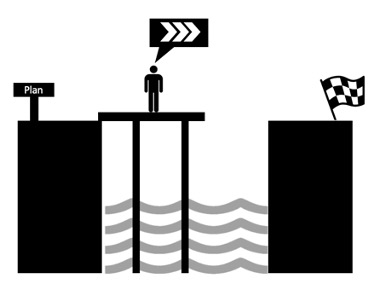How do I check if someone is driving properly in the fog? In the same way, you can currently imagine your job as a project manager, manager or department head in times of Corona. For a long time I have been accompanying managers in times of complexity through my advice and consultation hours.
Especially at higher management levels, it is important to assess managers quickly and correctly. Imagine: when a manager does not seem to agree on a job and has been approaching a project or organizational development incorrectly or not at all for months. Not only his performance incl. Salary does not generate any benefit, but also the team with often up to 20 employees.
High costs in the case of misjudgments by executives
I would like to start with a concrete example: I recently had my telephone consultation again and the following happened: A department head had a team leader with a team of 8 people (Scrum Team). The team was supposed to develop software and unfortunately after a year it turned out that this software would never be finished. This wrong decision cost the company around 500,000 euros due to salaries.
The head of department was bent and wondered why he couldn’t notice this sooner. In response to my questions, we noticed that the team leader could not show any backlogs, did not disclose the sprint results and reacted aggressively to questions. So was it obvious that the team leader had to fail?
Lack of planning and systematics
After the conversation, I also summarized my last projects, which I experienced in practice and did not go so well. 90% of them had one thing in common: The team leader or manager had a clear goal but unfortunately no plan or methodology for how to achieve this in a structured manner. Shrugging of the shoulders, aggressiveness or “let’s just make it agile” were the most common answers. In fact, I was recently accused that my inquiries meant a lack of trust in the team and that everyone was very disappointed in me. In particular, the emotional possibility of nipping inquiries in the bud seemed efficient to me, as it blinded a top manager I knew for almost 2 years.

The majority of managers fared like the figure in the picture. The task is clear: there is a cliff to be crossed. But there is no plan and no system of how the crossing should take place. It will work out somehow or we will “just make it agile”. In my opinion, doing this will never result in the figure crossing the water. So, as a department head, I would 99.9% assume that the project will fail. I would do the following:
- Request a project plan and after some time
- provide a project manager and then
- take on the topic yourself
In practice, I often experience that the project manager is hardly involved and that asking for a project plan directly leads to aggressiveness from the manager. Often it was already clear to me: There is no other option than to disempower the manager. The ego may get in the way of admitting that the topic is a bit too big and that help is needed. Self-defined practitioners in particular have problems with abstract subjects.
Reading tip: Why practitioners have problems with methodology
Achieving the goal with methodology and systematics
Now let’s look at the opposite. With the help of a clearly defined procedure, the figure wants to build a bridge and slowly starts to build it. Task packages are defined and progress is shown per week. Regular reports are also provided.
Reading tip: Agility as an excuse for lack of plan

My doctoral thesis was also very complex and at the beginning I set up a clear research plan, which I followed for five years. In the end I got there and was able to show my doctoral supervisor where I stood. I can also say from my own experience: The more complex the topic, the more important it is that I follow a clear plan and a methodology, e.g. Scrum or Kanban.
Conclusion
Success in complex environments cannot be planned. However, only method adherence helps against unplannability. Even with a marathon you never know what’s coming, but there is a very clear training plan for the runners. Here, too, a systematic and methodical approach is not used. So always check your managers carefully and rely on methodology in complex environments!
Reading tip: Success is a marathon!
[werbung] [fotolia]


